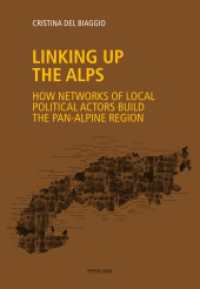Full Description
Contemporary education research, policy and practice are complex and challenging. The political struggle over what constitutes curriculum and pedagogy is framed by quasi-markets and technocratic models of education. This has had a significant effect on larger issues of policy. But it has also had profound effects inside educational sites in terms of the economics and politics of what is and is not considered 'legitimate' knowledge, over what should be taught, how it should be taught, and by whom.
Re-imagining Education for Democracy takes up the unfinished project of resisting the de-democratisation of education and growing levels of social and educational inequality. Where are the spaces for change and articulating hopeful alternatives? How might we imagine and produce different futures? What are the opportunities for affirmative interference, and how could we produce a more sustainable re-imagining and re-doing of the critical project of education?
The work is framed within two complementary sections: the first addresses some key policy, political and philosophical concerns of contemporary educational contexts, while the second provides a series of empirical case studies and other local-global narratives of resisting and reframing dominant discourses in education around the world. The chapters provide a range of empirical, methodological and conceptual focuses, from different educational communities and international contexts, engaging with the proposition of re-imagining education for democracy in multiple and diverse ways. This book will be essential reading for researchers and students of education research, policy and practice.
Contents
1. Education and Democracy in Dangerous Times (Stewart Riddle and Michael W. Apple); Part I: Contemporary Education Contexts and the Challenges for Democracy; 2. The Paradox of Democratisation: College Prep and The Production of Shadow Capital (Amy Stich and Kristin Cipollini); 3. Global Social Movements and Dialogical Pedagogy: Politics, Power and Process (Emma Rowe and Jessica Gerrard); 4. Resisting Governance by Numbers: Some Lessons from Schools (Nerida Spina, Jess Harris, Suzanne Carrington and Mel Ainscow); 5. Pursuing Pragmatic-Radical Curriculum Democracy: Students as Co-Researchers on Problems that Matter (Lew Zipin and Marie Brennan); Part II: Local-global Narratives of resisting and Reframing Education; 6. What Is Valued Knowledge and Where Does It Live? Educational Consciousness and the Democratisation of Education (Robin Bellingham, Matthew K. E. Thomas, Karen Charman, Mary Dixon and Jayson Cooper); 7. Critical Literacy as Legitimate Knowledge: The Importance of Teacher Agency (Jennifer Alford, Catarina Schmidt and Anna Lyngfelt); 8. Re-Imagining Young Children's Literacy Education for their Democratic Participation Pauline Harris, Andrew Peterson and Cynthia Brock); 9. Teaching Democracy While Students Leave Their Shoes at the Door: Attending to Mundane Practices of Power Inequality in Thai Schools (Surawit Assapun, Thornchanok Uerpairojkit and James Burford); 10. Wither Democracy? The Rise of Epistocracy and Monopoly in School Governance (Andrew Wilkins); 11. Jacinta's Story: Challenging Neoliberal Practices and Creating Democratic Spaces in Public High Schools (Janean Robinson, Barry Down and John Smyth); 12. Towards an Arts Education for Cultural Citizenship (Pat Thomson, Christine Hall, Lexi Earl and Corinna Geppert); 13. Democratic Management in Brazilian Schools: Practices of Resistance (Márcia Aparecida Jacomini, Lisete Regina Gomes Arelaro, Cileda Dos Santos Sant'Anna Perrella, Silvio Ricardo Gomes Carneiro and Marieta Gouvêa De Oliveira Penna); 14. Becoming Third World Women Educators (Bruna Lopes Duraes); 15. 'Beating Their Unclad Chests': Voluntourism, International Service and The Place of Critical Pedagogy Inside the Neoliberal University (Sam Schulz); 16. Grassroots Democracy In New York State: Opting-Out and Resisting the Corporate Reform Agenda in Schooling (Bob Lingard and David Hursh)








